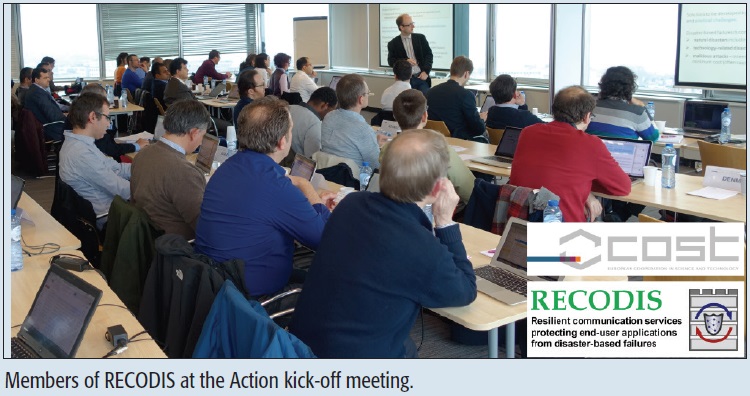
March 1, 2016 was the date of the kick-off meeting of COST CA15127 Action, entitled Resilient Communication Services Protecting End-user Applications from Disaster-based Failures (RECODIS). This one-day meeting took place at the COST premises in Brussels, Belgium, and was chaired by the Action Chair, Prof. Jacek Rak from Gdansk University of Technology, Poland, jointly with COST officers Dr. Giuseppe Lugano and Ms. Carmencita Malimban. This Action, co-chaired by Prof. David Hutchison from Lancaster University, UK, now comprises around 150 Members from over 50 academic, industrial, and governmental institutions from 28 European countries.
RECODIS was recently approved by COST (the oldest and widest European intergovernmental framework for trans-national Co-Operation in Science and Technology). In its forthcoming four-year period (March 1, 2016 to February 29, 2020), RECODIS aims to develop appropriate solutions to improve communications resilience in the presence of disaster-based disruptions concerning both existing and emerging communication network architectures. This is of the utmost importance, since disaster-based failures can seriously disrupt any communication network and render its services unavailable or severely degraded. Such disruptions may be caused by natural disasters (e.g., earthquakes, hurricanes, fires, heavy rainfall), technology-related failures (e.g., a power blackout), or various malicious attacks, and they are observably increasing in number, intensity and scale.
The need to introduce a set of disaster-resilience techniques is evident also because of a current lack of built-in mechanisms to assure the ongoing availability of network services in the presence of disaster-based failures. The impact of such failures on the performance of communication networks is often severe. Meanwhile, the common expectation is that communication networks (forming an important, but often under-appreciated, part of the critical infrastructure of everyday life) should be “always available”, which is actually immensely hard to achieve, especially in post-disaster periods when there is increased network traffic generated by people desperately seeking information, or trying to communicate with each other.
In particular, the RECODIS researchers aim to develop appropriate solutions to improve communications resilience for existing communication networks (in particular, IPv4/IPv6-based, current Internet), and emerging architectures of the global communications infrastructure (viz., the Future Internet). RECODIS research will include the introduction of algorithms for resilient routing together with metrics for establishing disaster-resistant communication paths, as well as mechanisms to make use of predictions about disaster-based threats. Another important objective is to prepare recommendations for network and service operators on how to design communication networks with improved resistance to disaster-based failures.
RECODIS is structured into five Working Groups (WGs): WG1–large-scale natural disasters; WG2–weather-based disruptions; WG3–technology-related disasters; WG4–malicious human activities; WG5–oversight across WGs + general principles, challenges, definitions, as well as architecture and mechanisms of disaster-resistant communication systems.
Instruments to achieve the Action aims include regular meetings of Action members (twice a year), short term scientific missions, and training schools for network operators and other interested parties. Action results will be published in white papers, conference/journal papers, presented in special sessions of conferences/ workshops, and in the Action final book.
Up-to-date information on RECODIS and its outcomes can be found at http://www.cost-recodis.eu